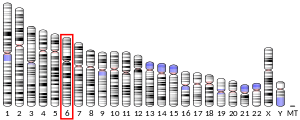ABCF1
ATP-binding cassette sub-family F member 1 is a protein that in humans is encoded by the ABCF1 gene.[5][6]
The protein encoded by this gene is a member of the superfamily of ATP-binding cassette (ABC) transporters. ABC proteins transport various molecules across extra- and intra-cellular membranes. ABC genes are divided into seven distinct subfamilies (ABC1, MDR/TAP, MRP, ALD, OABP, GCN20, White). This protein is a member of the GCN20 subfamily. Unlike other members of the superfamily, this protein lacks the transmembrane domains which are characteristic of most ABC transporters. This protein may be regulated by tumor necrosis factor-alpha and play a role in enhancement of protein synthesis and the inflammation process.[6]
See also
References
- 1 2 3 ENSG00000225989, ENSG00000236149, ENSG00000232169, ENSG00000204574, ENSG00000236342, ENSG00000231129 GRCh38: Ensembl release 89: ENSG00000206490, ENSG00000225989, ENSG00000236149, ENSG00000232169, ENSG00000204574, ENSG00000236342, ENSG00000231129 - Ensembl, May 2017
- 1 2 3 GRCm38: Ensembl release 89: ENSMUSG00000038762 - Ensembl, May 2017
- ↑ "Human PubMed Reference:".
- ↑ "Mouse PubMed Reference:".
- ↑ Richard M, Drouin R, Beaulieu AD (Dec 1998). "ABC50, a novel human ATP-binding cassette protein found in tumor necrosis factor-alpha-stimulated synoviocytes". Genomics. 53 (2): 137–45. doi:10.1006/geno.1998.5480. PMID 9790762.
- 1 2 "Entrez Gene: ABCF1 ATP-binding cassette, sub-family F (GCN20), member 1".
Further reading
- Klein I, Sarkadi B, Váradi A (2000). "An inventory of the human ABC proteins". Biochim. Biophys. Acta. 1461 (2): 237–62. doi:10.1016/s0005-2736(99)00161-3. PMID 10581359.
- You KT, Li LS, Kim NG, et al. (2007). "Selective Translational Repression of Truncated Proteins from Frameshift Mutation-Derived mRNAs in Tumors". PLoS Biol. 5 (5): e109. doi:10.1371/journal.pbio.0050109. PMC 1854916. PMID 17456004.
- Ota M, Katsuyama Y, Hamano H, et al. (2007). "Two critical genes (HLA-DRB1 and ABCF1)in the HLA region are associated with the susceptibility to autoimmune pancreatitis". Immunogenetics. 59 (1): 45–52. doi:10.1007/s00251-006-0178-2. PMID 17119950.
- Olsen JV, Blagoev B, Gnad F, et al. (2006). "Global, in vivo, and site-specific phosphorylation dynamics in signaling networks". Cell. 127 (3): 635–48. doi:10.1016/j.cell.2006.09.026. PMID 17081983.
- Beausoleil SA, Villén J, Gerber SA, et al. (2006). "A probability-based approach for high-throughput protein phosphorylation analysis and site localization". Nat. Biotechnol. 24 (10): 1285–92. doi:10.1038/nbt1240. PMID 16964243.
- Gerhard DS, Wagner L, Feingold EA, et al. (2004). "The Status, Quality, and Expansion of the NIH Full-Length cDNA Project: The Mammalian Gene Collection (MGC)". Genome Res. 14 (10B): 2121–7. doi:10.1101/gr.2596504. PMC 528928. PMID 15489334.
- Ballif BA, Villén J, Beausoleil SA, et al. (2005). "Phosphoproteomic analysis of the developing mouse brain". Mol. Cell. Proteomics. 3 (11): 1093–101. doi:10.1074/mcp.M400085-MCP200. PMID 15345747.
- Beausoleil SA, Jedrychowski M, Schwartz D, et al. (2004). "Large-scale characterization of HeLa cell nuclear phosphoproteins". Proc. Natl. Acad. Sci. U.S.A. 101 (33): 12130–5. doi:10.1073/pnas.0404720101. PMC 514446. PMID 15302935.
- Mungall AJ, Palmer SA, Sims SK, et al. (2003). "The DNA sequence and analysis of human chromosome 6". Nature. 425 (6960): 805–11. doi:10.1038/nature02055. PMID 14574404.
- Strausberg RL, Feingold EA, Grouse LH, et al. (2003). "Generation and initial analysis of more than 15,000 full-length human and mouse cDNA sequences". Proc. Natl. Acad. Sci. U.S.A. 99 (26): 16899–903. doi:10.1073/pnas.242603899. PMC 139241. PMID 12477932.
- Tyzack JK, Wang X, Belsham GJ, Proud CG (2000). "ABC50 interacts with eukaryotic initiation factor 2 and associates with the ribosome in an ATP-dependent manner". J. Biol. Chem. 275 (44): 34131–9. doi:10.1074/jbc.M002868200. PMID 10931828.
External links
- ABCF1+protein,+human at the US National Library of Medicine Medical Subject Headings (MeSH)
- Human ABCF1 genome location and ABCF1 gene details page in the UCSC Genome Browser.
This article incorporates text from the United States National Library of Medicine, which is in the public domain.



